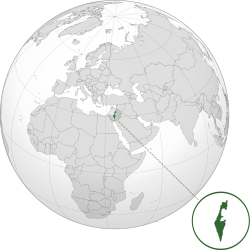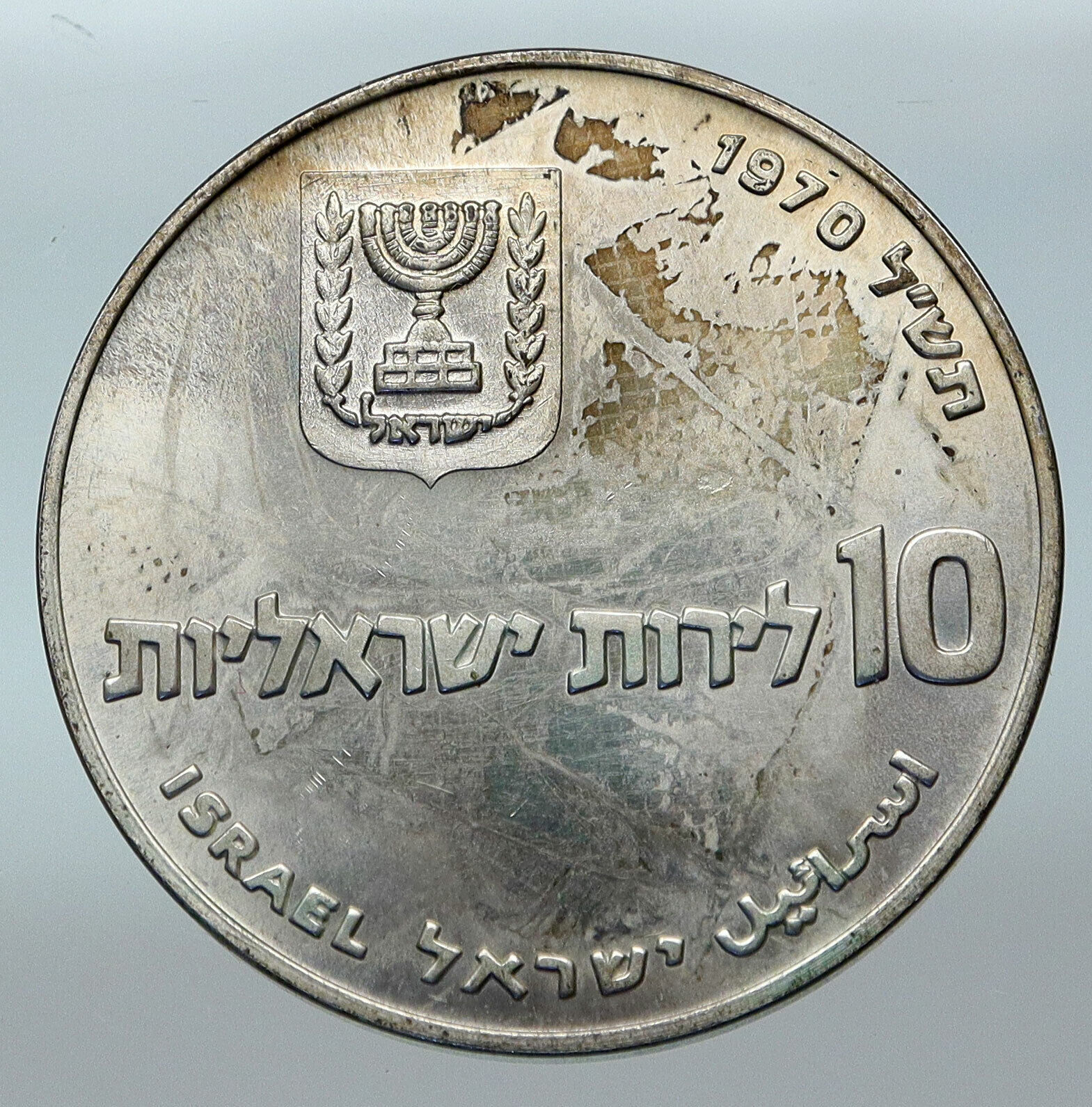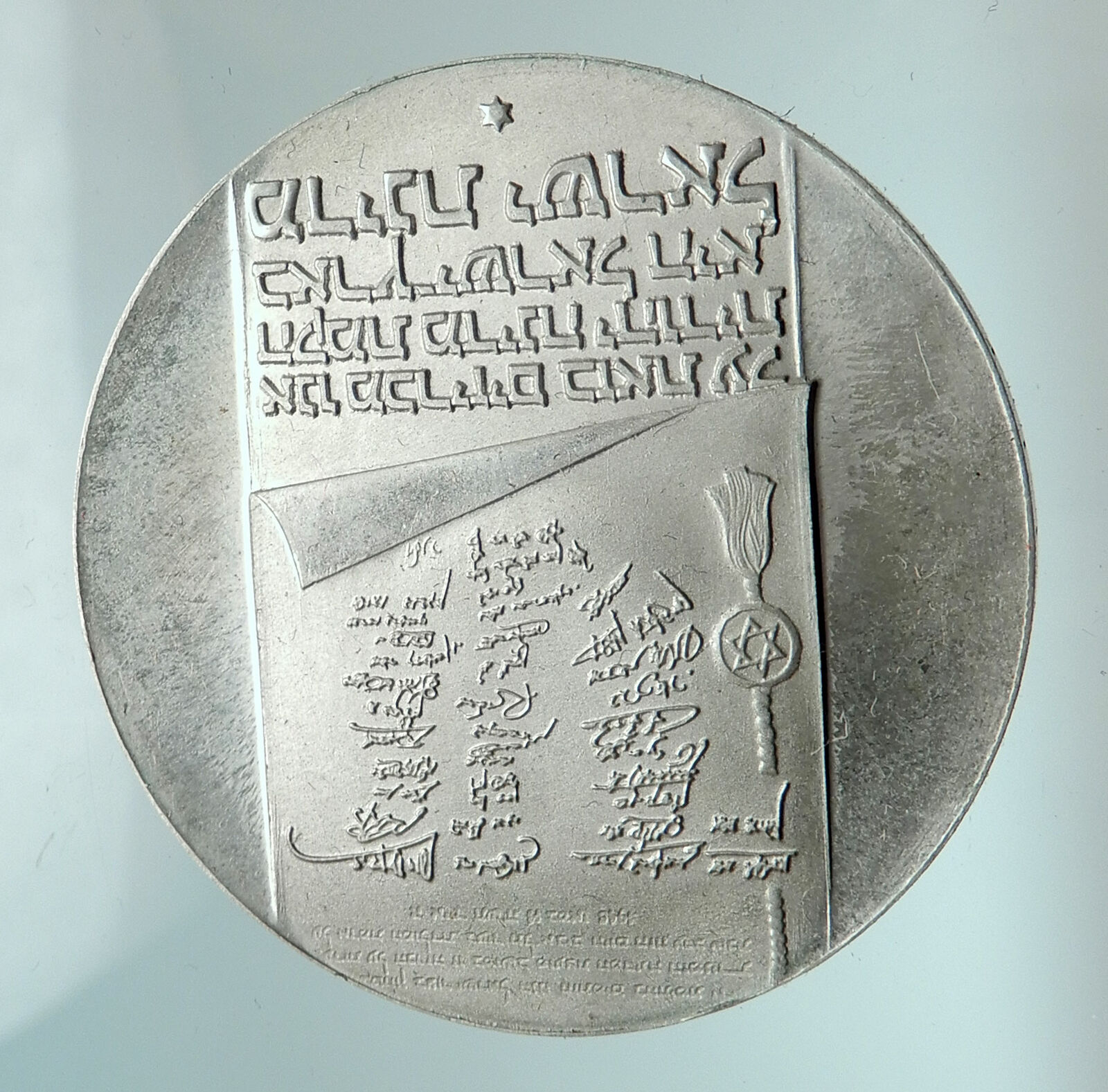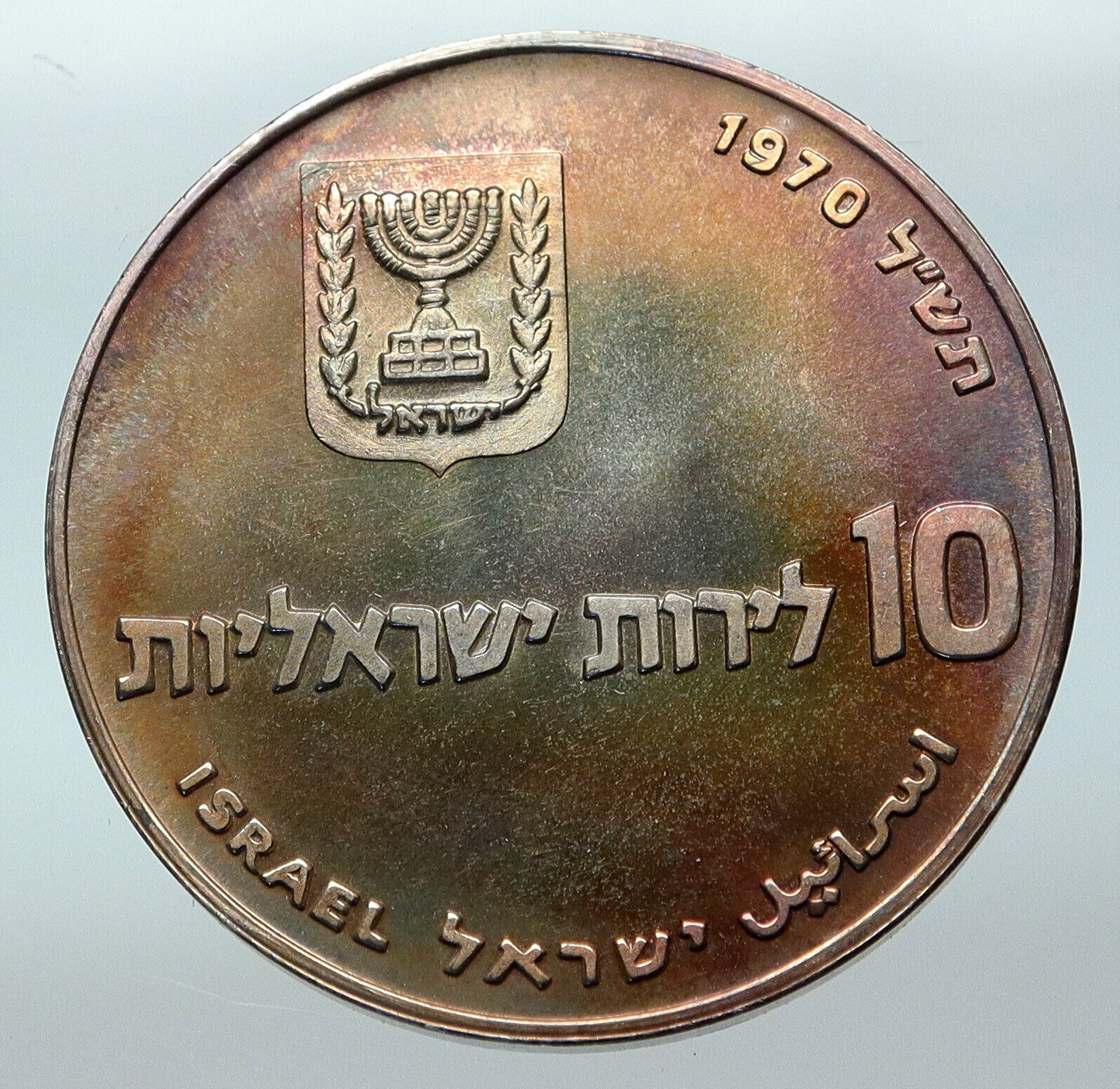|
Israel – 29th Anniversary of Independence
10th Anniversary of Reunification of Jerusalem
1977 Proof Silver 25 Lirot 34mm (20.00 grams) 0.500 Silver (0.3215 oz. ASW)
Reference: KM# 88
אחוות עמים בירושלים בירת ישראל BROTHERHOOD IN JERUSALEM CAPITAL OF ISRAEL, Stylized bird below castle.
اسرائيل ישראל ISRAEL 1977 תשל”ז , Large value above menorah flanked by sprigs. Star of David on lower left corner.
Coin Notes:
This coin commemorates the 10th anniversary of Jerusalem reunification, and presaged Sadat’s visit later that year.
You are bidding on the exact item pictured, provided with a Certificate of Authenticity and Lifetime Guarantee of Authenticity.
-Aerial-Temple_Mount-(south_exposure).jpg/220px-Jerusalem-2013(2)-Aerial-Temple_Mount-(south_exposure).jpg) The reunification of Jerusalem refers to the June 1967 administrative merger of West Jerusalem and East Jerusalem by Israel, following the conquest of the Eastern half of the city (including the walled Old City) from Jordan during the Six Day War. In 1980, the merger of West and East Jerusalem was legalized in Israel by the Jerusalem Law, though this attempt to change the status of Jerusalem was rejected by the United Nations (UN) and most of the international community. The Reunification is celebrated as an Israeli national holiday, Jerusalem Day; the 50th anniversary was commemorated with celebrations in 2017. The reunification of Jerusalem refers to the June 1967 administrative merger of West Jerusalem and East Jerusalem by Israel, following the conquest of the Eastern half of the city (including the walled Old City) from Jordan during the Six Day War. In 1980, the merger of West and East Jerusalem was legalized in Israel by the Jerusalem Law, though this attempt to change the status of Jerusalem was rejected by the United Nations (UN) and most of the international community. The Reunification is celebrated as an Israeli national holiday, Jerusalem Day; the 50th anniversary was commemorated with celebrations in 2017.
Jordan and an alliance of Arab states rejected the 1947 UN Partition Plan under which Jerusalem was to be a corpus separatum, instead invading former Palestinian Mandate territory, and by the armistice in 1949 was in control of the Old City and East Jerusalem (excluding Mount Scopus). The Arab invading armies failed to take control over the rest of Israel, including West Jerusalem. The city was then divided along the 1949 Armistice Line. East Jerusalem was annexed to Jordan in 1950. The city remained divided until the Six-Day War in 1967.
.jpg/170px-Flickr_-_Israel_Defense_Forces_-_Life_of_Lt._Gen._Yitzhak_Rabin,_7th_IDF_Chief_of_Staff_in_photos_(14).jpg) As part of the Jordanian campaign, on June 5, 1967, the Jordanian Army began shelling Israel.When the Israeli cabinet convened to decide how to respond, Yigal Allon and Menahem Begin argued that this was an opportunity to take the Old City of Jerusalem, but Eshkol decided to defer any decision until Moshe Dayan and Yitzhak Rabin could be consulted.During the late afternoon of June 5, the Israelis launched an offensive to encircle Jerusalem, which lasted into the following day. On June 7, heavy fighting ensued. Dayan had ordered his troops not to enter the Old City; however, upon hearing that the UN was about to declare a ceasefire, he changed his mind, and without cabinet clearance, decided to capture it. As part of the Jordanian campaign, on June 5, 1967, the Jordanian Army began shelling Israel.When the Israeli cabinet convened to decide how to respond, Yigal Allon and Menahem Begin argued that this was an opportunity to take the Old City of Jerusalem, but Eshkol decided to defer any decision until Moshe Dayan and Yitzhak Rabin could be consulted.During the late afternoon of June 5, the Israelis launched an offensive to encircle Jerusalem, which lasted into the following day. On June 7, heavy fighting ensued. Dayan had ordered his troops not to enter the Old City; however, upon hearing that the UN was about to declare a ceasefire, he changed his mind, and without cabinet clearance, decided to capture it.
Israeli victory resulted in the city’s reunification. On 30 July 1980, the Knesset officially approved the Jerusalem Law, which called the city the complete and united capital.The reunification is celebrated by the annual Jerusalem Day, and Israeli national holiday. Special celebrations in 2017 to marked the Jubilee of the 1967 reunification.
 Israel (/ˈɪzriəl, ˈɪzreɪəl/; Hebrew: יִשְׂרָאֵל; Arabic: إِسْرَائِيل), officially the State of Israel, is a country in the Middle East, on the southeastern shore of the Mediterranean Sea and the northern shore of the Red Sea. It has land borders with Lebanon to the north, Syria to the northeast, Jordan on the east, the Palestinian territories of the West Bank and Gaza Strip to the east and west, respectively, and Egypt to the southwest. The country contains geographically diverse features within its relatively small area. Israel’s economic and technological center is Tel Aviv, while its seat of government and proclaimed capital is Jerusalem, although the state’s sovereignty over Jerusalem has only partial recognition. Israel (/ˈɪzriəl, ˈɪzreɪəl/; Hebrew: יִשְׂרָאֵל; Arabic: إِسْرَائِيل), officially the State of Israel, is a country in the Middle East, on the southeastern shore of the Mediterranean Sea and the northern shore of the Red Sea. It has land borders with Lebanon to the north, Syria to the northeast, Jordan on the east, the Palestinian territories of the West Bank and Gaza Strip to the east and west, respectively, and Egypt to the southwest. The country contains geographically diverse features within its relatively small area. Israel’s economic and technological center is Tel Aviv, while its seat of government and proclaimed capital is Jerusalem, although the state’s sovereignty over Jerusalem has only partial recognition.

Israel has evidence of the earliest migration of hominids out of Africa. Canaanite tribes are archaeologically attested since the Middle Bronze Age, while the Kingdoms of Israel and Judah emerged during the Iron Age. The Neo-Assyrian Empire destroyed Israel around 720 BCE. Judah was later conquered by the Babylonian, Persian and Hellenistic empires and had existed as Jewish autonomous provinces. The successful Maccabean Revolt led to an independent Hasmonean kingdom by 110 BCE, which in 63 BCE however became a client state of the Roman Republic that subsequently installed the Herodian dynasty in 37 BCE, and in 6 CE created the Roman province of Judea. Judea lasted as a Roman province until the failed Jewish revolts resulted in widespread destruction, expulsion of Jewish population and the renaming of the region from Iudaea to Syria Palaestina. Jewish presence in the region has persisted to a certain extent over the centuries. In the 7th century the Levant was taken from the Byzantine Empire by the Arabs and remained in Muslim control until the First Crusade of 1099, followed by the Ayyubid conquest of 1187. The Mamluk Sultanate of Egypt extended its control over the Levant in the 13th century until its defeat by the Ottoman Empire in 1517. During the 19th century, national awakening among Jews led to the establishment of the Zionist movement in the diaspora followed by waves of immigration to Ottoman and later British Palestine.
 In 1947, the United Nations adopted a Partition Plan for Palestine recommending the creation of independent Arab and Jewish states and an internationalized Jerusalem. The plan was accepted by the Jewish Agency, and rejected by Arab leaders. The following year, the Jewish Agency declared the independence of the State of Israel, and the subsequent 1948 Arab-Israeli War saw Israel’s establishment over most of the former Mandate territory, while the West Bank and Gaza were held by neighboring Arab states. Israel has since fought several wars with Arab countries, and it has since 1967 occupied territories including the West Bank, Golan Heights and the Gaza Strip (still considered occupied after 2005 disengagement, although some legal experts dispute this claim). It extended its laws to the Golan Heights and East Jerusalem, but not the West Bank. Israel’s occupation of the Palestinian territories is the world’s longest military occupation in modern times. Efforts to resolve the Israeli-Palestinian conflict have not resulted in a final peace agreement. However, peace treaties between Israel and both Egypt and Jordan have been signed. In 1947, the United Nations adopted a Partition Plan for Palestine recommending the creation of independent Arab and Jewish states and an internationalized Jerusalem. The plan was accepted by the Jewish Agency, and rejected by Arab leaders. The following year, the Jewish Agency declared the independence of the State of Israel, and the subsequent 1948 Arab-Israeli War saw Israel’s establishment over most of the former Mandate territory, while the West Bank and Gaza were held by neighboring Arab states. Israel has since fought several wars with Arab countries, and it has since 1967 occupied territories including the West Bank, Golan Heights and the Gaza Strip (still considered occupied after 2005 disengagement, although some legal experts dispute this claim). It extended its laws to the Golan Heights and East Jerusalem, but not the West Bank. Israel’s occupation of the Palestinian territories is the world’s longest military occupation in modern times. Efforts to resolve the Israeli-Palestinian conflict have not resulted in a final peace agreement. However, peace treaties between Israel and both Egypt and Jordan have been signed.
In its Basic Laws, Israel defines itself as a Jewish and democratic state. Israel is a representative democracy with a parliamentary system, proportional representation and universal suffrage. The prime minister is head of government and the Knesset is the legislature. Israel is a developed country and an OECD member, with the 32nd-largest economy in the world by nominal gross domestic product as of 2017. The country benefits from a highly skilled workforce and is among the most educated countries in the world with one of the highest percentages of its citizens holding a tertiary education degree. Israel has the highest standard of living in the Middle East, and has one of the highest life expectancies in the world.
|





-Aerial-Temple_Mount-(south_exposure).jpg/220px-Jerusalem-2013(2)-Aerial-Temple_Mount-(south_exposure).jpg) The reunification of Jerusalem refers to the June 1967 administrative merger of West Jerusalem and East Jerusalem by Israel, following the conquest of the Eastern half of the city (including the walled Old City) from Jordan during the Six Day War. In 1980, the merger of West and East Jerusalem was legalized in Israel by the Jerusalem Law, though this attempt to change the status of Jerusalem was rejected by the United Nations (UN) and most of the international community. The Reunification is celebrated as an Israeli national holiday, Jerusalem Day; the 50th anniversary was commemorated with celebrations in 2017.
The reunification of Jerusalem refers to the June 1967 administrative merger of West Jerusalem and East Jerusalem by Israel, following the conquest of the Eastern half of the city (including the walled Old City) from Jordan during the Six Day War. In 1980, the merger of West and East Jerusalem was legalized in Israel by the Jerusalem Law, though this attempt to change the status of Jerusalem was rejected by the United Nations (UN) and most of the international community. The Reunification is celebrated as an Israeli national holiday, Jerusalem Day; the 50th anniversary was commemorated with celebrations in 2017..jpg/170px-Flickr_-_Israel_Defense_Forces_-_Life_of_Lt._Gen._Yitzhak_Rabin,_7th_IDF_Chief_of_Staff_in_photos_(14).jpg) As part of the Jordanian campaign, on June 5, 1967, the Jordanian Army began shelling Israel.When the Israeli cabinet convened to decide how to respond, Yigal Allon and Menahem Begin argued that this was an opportunity to take the Old City of Jerusalem, but Eshkol decided to defer any decision until Moshe Dayan and Yitzhak Rabin could be consulted.During the late afternoon of June 5, the Israelis launched an offensive to encircle Jerusalem, which lasted into the following day. On June 7, heavy fighting ensued. Dayan had ordered his troops not to enter the Old City; however, upon hearing that the UN was about to declare a ceasefire, he changed his mind, and without cabinet clearance, decided to capture it.
As part of the Jordanian campaign, on June 5, 1967, the Jordanian Army began shelling Israel.When the Israeli cabinet convened to decide how to respond, Yigal Allon and Menahem Begin argued that this was an opportunity to take the Old City of Jerusalem, but Eshkol decided to defer any decision until Moshe Dayan and Yitzhak Rabin could be consulted.During the late afternoon of June 5, the Israelis launched an offensive to encircle Jerusalem, which lasted into the following day. On June 7, heavy fighting ensued. Dayan had ordered his troops not to enter the Old City; however, upon hearing that the UN was about to declare a ceasefire, he changed his mind, and without cabinet clearance, decided to capture it. Israel (/ˈɪzriəl, ˈɪzreɪəl/; Hebrew: יִשְׂרָאֵל; Arabic: إِسْرَائِيل), officially the State of Israel, is a country in the Middle East, on the southeastern shore of the Mediterranean Sea and the northern shore of the Red Sea. It has land borders with Lebanon to the north, Syria to the northeast, Jordan on the east, the Palestinian territories of the West Bank and Gaza Strip to the east and west, respectively, and Egypt to the southwest. The country contains geographically diverse features within its relatively small area. Israel’s economic and technological center is Tel Aviv, while its seat of government and proclaimed capital is Jerusalem, although the state’s sovereignty over Jerusalem has only partial recognition.
Israel (/ˈɪzriəl, ˈɪzreɪəl/; Hebrew: יִשְׂרָאֵל; Arabic: إِسْرَائِيل), officially the State of Israel, is a country in the Middle East, on the southeastern shore of the Mediterranean Sea and the northern shore of the Red Sea. It has land borders with Lebanon to the north, Syria to the northeast, Jordan on the east, the Palestinian territories of the West Bank and Gaza Strip to the east and west, respectively, and Egypt to the southwest. The country contains geographically diverse features within its relatively small area. Israel’s economic and technological center is Tel Aviv, while its seat of government and proclaimed capital is Jerusalem, although the state’s sovereignty over Jerusalem has only partial recognition.
 In 1947, the United Nations adopted a Partition Plan for Palestine recommending the creation of independent Arab and Jewish states and an internationalized Jerusalem. The plan was accepted by the Jewish Agency, and rejected by Arab leaders. The following year, the Jewish Agency declared the independence of the State of Israel, and the subsequent 1948 Arab-Israeli War saw Israel’s establishment over most of the former Mandate territory, while the West Bank and Gaza were held by neighboring Arab states. Israel has since fought several wars with Arab countries, and it has since 1967 occupied territories including the West Bank, Golan Heights and the Gaza Strip (still considered occupied after 2005 disengagement, although some legal experts dispute this claim). It extended its laws to the Golan Heights and East Jerusalem, but not the West Bank. Israel’s occupation of the Palestinian territories is the world’s longest military occupation in modern times. Efforts to resolve the Israeli-Palestinian conflict have not resulted in a final peace agreement. However, peace treaties between Israel and both Egypt and Jordan have been signed.
In 1947, the United Nations adopted a Partition Plan for Palestine recommending the creation of independent Arab and Jewish states and an internationalized Jerusalem. The plan was accepted by the Jewish Agency, and rejected by Arab leaders. The following year, the Jewish Agency declared the independence of the State of Israel, and the subsequent 1948 Arab-Israeli War saw Israel’s establishment over most of the former Mandate territory, while the West Bank and Gaza were held by neighboring Arab states. Israel has since fought several wars with Arab countries, and it has since 1967 occupied territories including the West Bank, Golan Heights and the Gaza Strip (still considered occupied after 2005 disengagement, although some legal experts dispute this claim). It extended its laws to the Golan Heights and East Jerusalem, but not the West Bank. Israel’s occupation of the Palestinian territories is the world’s longest military occupation in modern times. Efforts to resolve the Israeli-Palestinian conflict have not resulted in a final peace agreement. However, peace treaties between Israel and both Egypt and Jordan have been signed. 




